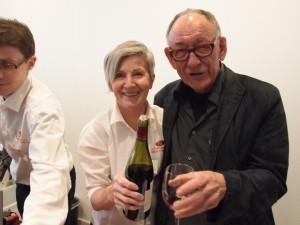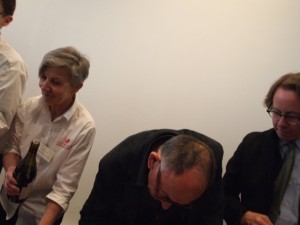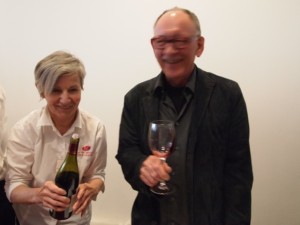MP: Your label is synonymous with traditional vinification and terroir-driven expression. How do you communicate a wine’s integrity to your customers?
KL: I certainly tried over the years, and in my book Adventures on the Wine Route there are lessons throughout the book without preaching; just telling what I saw.
For example, I was going over France and tasting wine out of the barrel. And I’d remember the fresh, vibrant wine I’d tasted. But when it gets to California it becomes flat, lost its best quality, because the wines were just shipped in normal metal containers and would go through the Panama Canal and then to California. So one year I tried refrigerated containers and the wine arrived impeccable.

One time, one of my wineries that I’d been working with for 3 or 4 years started to filter without telling me. The color’s lighter, the aroma’s weaker, there’s not as much sweetness to it, and not as much flesh. ‘What happened? What did you do?’ – The filtration craze had caught on. Even today French people can’t accept a little speck in the bottle, like the wine’s dirty or something. I didn’t like it as much as I’d liked it before, so I asked them if they would start bottling it unfiltered for me and they can filter it for everybody else. So for years I had that experience of being able to compare exactly the same wine filtered and unfiltered. It wasn’t just some weird idea I had. There was a vast difference. None of them wanted to admit it.
I just did a tasting with my staff. It was the Vieux Telegraphe Chateauneuf Du Pape 1983 vintage. I had a bottle of the filtered, and the same wine unfiltered. We had a bunch of other vintages, too. Interestingly the favorite wine of the tasting was the ‘83 unfiltered. The least favorite wine was the ‘83 filtered. It was no longer drinkable, because the aging potential was taken away.
So I’ll write that story for my clients in my brochure to try to enforce that. It’s not just a philosophical thing for me, it’s an experience. I’m looking for the best wine I can get.
MP: After 30 years of close contact with traditional wine makers in France, what’s changed for the better, and what’s changed for worse?
KL: The way I see it, there are now two markets of French wines. There are what I call “pop wines,” like pop music, where the music is tailored to what you think the public demands. Then the other side of French wine is wine where you’re working with what nature gives you. Of course you’re a winemaker, you’re intervening. You’re pruning vines and stuff like that, but you’re not adding chemicals, you’re not taking out things – you’re doing as little as possible. You still want a drinkable wine, you have to make it drinkable – if you let a wine go on its own, it could start re-fermenting, it can turn to vinegar. There’s a lot of things than can go wrong, the winemaker still has to intervene a little.
I’d put the Bordeaux wines of today in the “pop wine” market. You taste Latour, Lafite, and so on, it’s hard to tell them apart anymore. They’re all trying to make the same wine: big, black and oaky.
If you go to regions like Provence, the Rhône, Burgundy – a lot of people trying to make the most natural wine possible. They’re doing a lot of work in their vineyards to protect their soils, where for years they had been adding chemical fertilizers. They were really destroying their soil.

 MP: Your name is literally part of many of the labels you distribute. How does that come about?
MP: Your name is literally part of many of the labels you distribute. How does that come about?
KL: For one thing, to import a wine you have to put the name of your company on the label, mine is Kermit Lynch Wine Merchant, so automatically my name has to be on all the bottles I import. But I used to just have my import strip in the back. As I got better known, I noticed more and more that people have to turn around all the bottles to try to find my name on the import strip. So like many of my competitors who are importers, I put my name on the front now, so people know when they see the front label: Oh that’s a Kermit Lynch selection. Almost everybody does it now, there’s nothing new about it. It just took me about 35 years to figure out it’s a good idea.
MP: Spending so much time in French wine country, what town/area do you always look forward to going back to?
KL: Ooh-la-la! Well, Provence more than anything. The first time I went there, I fell in love. There’s something about the air there, the smells; the ocean is right there – the Mediterranean. I feel good there.
MP: What wines do you often enjoy at home?
KL: Bandol, and of course my own wine, because I make that to my taste.
MP: Why Corsica?
KL: I’ve been going there since 1981. For years there wasn’t much going on. It’s really wild there, it’s not at all like the Côte d’Azur or the Riviera and all that. Here you are on the Mediterranean, this beautiful island, its gorgeous beaches, and it’s unspoiled. So I’d go on vacations there, I’d rent sailboats, I’d take the family, I’d cruise around the island. You’d find these beautiful sand beaches where there’s nobody there, there’s no road there. But I kept going for wine.
In fact, La Revue du Vin de France – their main wine magazine – just wrote about four months ago that Corsica is the most exciting wine region in France today. Can you believe it?! These wines are awesome, I just love them. I like to cook Mediterranean, it’s the kind of food l like. Those wines go with all those dishes.
The market has really opened up now in the United States. Clients now are willing to try these wines, the wines of Sicily for example, or Sardinia. You see these wines around a lot now. 20 years ago some of those were almost impossible to sell. When I tried to sell to a distributor, he’d say ‘You can’t sell that!’ and I’d say ‘No, you can’t sell it, I can!’
MP: Simple choice: Woody Guthrie or Bob Dylan?
KL: Bob Dylan!
I make CDs to support charity – I’ve covered 3 or 4 Dylan songs on different CDs. I like his songs a lot,. But I don’t do them in that folk way. I’d rather get a good rock band, with electric guitars.
